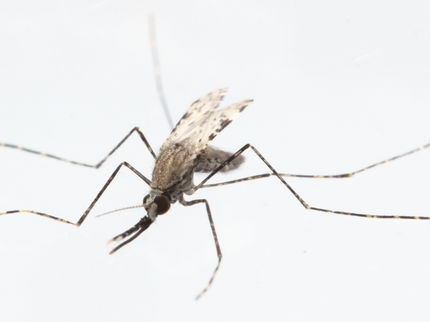New discovery could advance the fight against malaria
Key proteins for malaria reproduction found in the mosquito
Advertisement
How can the malaria pathogen be prevented from multiplying successfully? Dr. Franziska Hentzschel, a scientist at the Medical Faculty of Heidelberg University, has discovered a new approach to this. Her research is reported in the current issue of the scientific journal "Nature Microbiology".
Malaria is caused by the single-celled parasite Plasmodium, which is transmitted to humans by the Anopheles mosquito when it sucks blood. The parasite needs both hosts, mosquito and human, in order to develop fully. However, little research has been carried out into the cell biological mechanisms that the parasite uses in the mosquito to reproduce. Many proteins that control the reproduction of the malaria pathogen are also not yet known. Dr. Franziska Hentzschel, research group leader in the Department of Parasitology at the Center for Infectious Diseases at Heidelberg University Hospital, and her team have now discovered a group of proteins that are essential for the successful sexual reproduction of the parasite in the mosquito. This discovery thus provides an important clue as to how the reproduction of the parasites could be blocked.
New discovery could advance the fight against malaria
The newly discovered proteins form a complex that is known in humans and many other organisms as the "Arp2/3 complex". However, it was not previously suspected in malaria parasites because no genes of this widespread Arp2/3 complex were found in the parasite's genome. Hentzschel has now discovered not only that Plasmodium does have an Arp2/3 complex, but also that this complex has an unusual, previously unknown function: It ensures that the genetic material is correctly distributed to these cells during the formation of male gametes. Without the Arp2/3 complex, the parasite males are missing part of their genetic material. What is particularly exciting for the fight against the parasites is that although these "castrated" males can still fertilize females in the mosquito, the parasite offspring die after just a few days, meaning that they can no longer enter the mosquito's salivary glands and be transmitted to a new human host through a bite.
Hentzschel is currently investigating how the Arp2/3 complex is formed and activated as well as the molecular mechanisms by which it controls the division of the genetic material. She is being funded for this research project by a Starting Grant from the European Research Council (ERC) worth 1.5 million euros for five years. With her research, she hopes to find potential targets to interrupt the reproduction of the malaria pathogen and stop the transmission of malaria in the future. To date, there are millions of malaria infections and several hundred thousand deaths worldwide every year. In addition, new resistances are constantly emerging, making it necessary to constantly develop new drugs. Although there is a vaccine that can reduce the number of cases, it is not sufficiently effective.
Note: This article has been translated using a computer system without human intervention. LUMITOS offers these automatic translations to present a wider range of current news. Since this article has been translated with automatic translation, it is possible that it contains errors in vocabulary, syntax or grammar. The original article in German can be found here.
Original publication
Franziska Hentzschel, David Jewanski, Yvonne Sokolowski, Pratika Agarwal, Anna Kraeft, Kolja Hildenbrand, Lilian P. Dorner, Mirko Singer, Matthias Marti, Friedrich Frischknecht; "An atypical Arp2/3 complex is required for Plasmodium DNA segregation and malaria transmission"; Nature Microbiology, 2025-6-13



















































